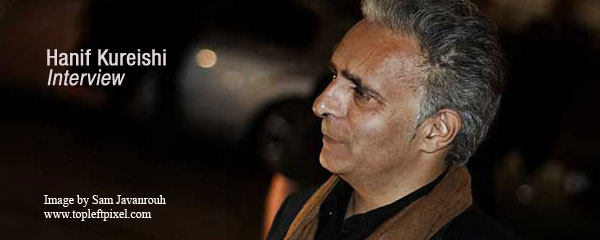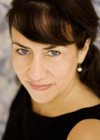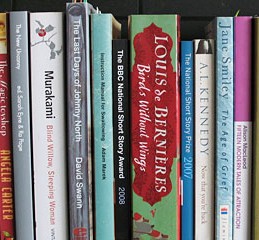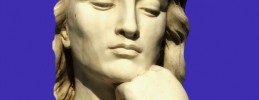
Hanif Kureishi CBE (b. 1954) is a novelist, short story writer, playwright, screenwriter, film-maker and, according to The Times (2008), one of ‘The 50 greatest British writers since 1945″. As a short story writer, he explores a heady range of subjects, including race and religion, love and sexuality, and the power of culture and the imagination.
Kureishi was born in Kent to an Indian father and an English mother. As the child of a mixed-race relationship, he grew up with a keen awareness of racism and ‘otherness’. His award-winning novel The Buddha of Suburbia opens with the now famous line, ”My name is Karim Amir, and I am an Englishman born and bred, almost.’
Kureishi attended Bromley Technical High School (where David Bowie had been a pupil previously). Later he read philosophy at King’s College, London, and in 1982 was appointed Writer in Residence at the Royal Court Theatre. In 1984, he wrote My Beautiful Laundrette, which received an Oscar nomination for Best Screenplay at a time when the young Kureishi was still living in council accommodation in London. He is now the author of over twenty major novels, story and essay collections, plays and screenplays, and his work has been translated into thirty-six languages. For his services to literature, he was made a CBE (Commander of the Order of the British Empire) and was awarded the Chevalier de l’Ordre des Arts des Lettres.
Alison MacLeod is the author of The Wave Theory of Angels (Penguin 2006) and Fifteen Modern Tales of Attraction (Penguin 2007). Her next novel is published by Hamish Hamilton (Penguin) in 2011. She is Professor of Contemporary Fiction at the University of Chichester (UK).
Alison MacLeod meets Hanif Kureishi in The Cafe Rouge in Shepherd’s Bush, London:
Alison MacLeod (weighing up the book): Hanif, your COLLECTED STORIES – all 700 pages – is, literally, a huge achievement. It’s been travelling with me in the last few weeks –
Hanif Kureishi: I hope I haven’t given you a hernia…
AM (laughing): I’m bearing up…. Okay, tell me, what attracts you, as a writer, to the short story form? What are its pleasures?
HK: What you want is a good idea. You’re lucky if you get a good idea. Sometimes a good idea just comes to you…
AM: And you trust the idea…
HK: On the whole. An idea is like a magnet. It attracts lots of other ideas to it. It’s just the beginning. One idea enables me to think about other things, so there are certain characters through whom I can think about that which I’m really trying to think about. But on the whole I don’t know what I’m thinking about until I start to try to think about it… I’m doing a new collection of stories at the moment: there’s a woman who’s ill in bed, and her friends come and sit with her, and they tell her stories each night, some of them funny, some of them sad, some of them horrifying, and some of them just entertaining… It’s a good opportunity for me to write in the short form.
AM: What’s difficult about it? What are the form’s constraints?
HK: Well, you can’t put too much in of course. But you spend all your time worrying about whether you’ve got the right amount in.
AM: You’ve written portraits of your father, for example, in different forms: in a memoir, in essay form, and in your novel THE BUDDHA OF SUBURBIA… What did fiction, in particular, allow you to get at, that perhaps the other forms didn’t?
HK: Well, there were lots of men in my family. My father came from a family of twelve, most of them boys, and when I was a kid I spent a lot of time hanging around with all these Pakistani men, who were drinking and watching soccer and talking and telling jokes… Most of them, very, very intelligent men; very educated men. So this was very impressive for a little kid – to be with all these guys. MY BEAUTIFUL LAUNDRETTE and THE BUDDHA OF SUBURBIA, I guess, are full of uncles and fathers and tough guys and men of different sorts… And then becoming a father myself – to three sons – has made me think also about the difference between being a father and a son; about what sort of father one has to be now versus the sort of father my father was in the sixties, for instance…I think what I try to do in my writing, really, is to explore Britain in the post-war period, in the period I’ve grown up in.
I think what I try to do in my writing, really, is to explore Britain in the post-war period, in the period I’ve grown up in.
AM: I’ve misspelled ‘launderette’ for years, I realise, because of MY BEAUTIFUL LAUNDRETTE! Why the misspelling?
HK (amused): I went to state school, didn’t I.
AM (laughing): At last, revelation… Okay, I’m curious: what for you, as a reader or as a writer, makes a really powerful short story? Is there a way, do you think, of describing that?
HK: Well… It depends on what you need at the time. I mean, when I was a kid I wanted to read ON THE ROAD because I could identify with those kids running away from home, basically – going across America. It’s probably not a story I would identify with now. It depends what you need. Books are a form of dialogue between you and the world, you and the author. The author speaks for you. When you read a book that you like, it’s as if the author has spoken the thoughts that you haven’t yet realised you’ve had.
AM: Your story ‘The Penis’ was inspired by ‘The Nose’. What took you to Gogol or to that story?
HK: I’d always read Gogol as a child. My father loved Russian literature, so we had a lot of Pushkin, Chekhov, Dostoevsky, Tolstoy in the house. That’s what my dad read. I remember reading DIARY OF A MADMAN and other stuff, just as a kid. It’s very, very funny and very dark.
AM: And your story ‘Lately’, of course, is based on Chekhov’s ‘The Duel’.
HK: That’s right. Well, my dad identified with the characters in Chekhov…
AM: In what way? Or how would you imagine he did?
HK: In the post-war period, the Pakistani upper middle class was gradually being decimated… really by extreme Islam, just as we know that the characters that Chekhov describes would soon be swept away by the Russian Revolution. So there’s a revolution coming in Pakistan… Eventually Pakistan will be over-run entirely by the Taliban, and that’s been happening, or been about to happen, for a long time. So you see there are these intellectuals wandering around for whom there’s really no use. And they want to go to Moscow: i.e., they want to get out but they can’t get out. They want to go to London or New York or Toronto but most of them can’t get out now. They’re too old. They haven’t got any money. So that sense of futility is an economic, social and political reality. I guess that’s why Dad, and later I, could see some use for Chekhovian characters.
AM: Like Chekhov, you absolutely dare to say what’s really on your characters’ minds. You’re remarkably honest in your work. Does that feel like a conscious gamble as you write or do you simply write as you see it?
HK: I write as I see it. I write down what I think. But what you’re doing is experimenting… experimenting in the sense of thinking, What if? What if I said that? What if I did that? So in that sense, writing is autobiographical. You’re describing a what-if? state of mind. Stories are thought experiments.
You’re describing a what-if state of mind. Stories are thought experiments.


